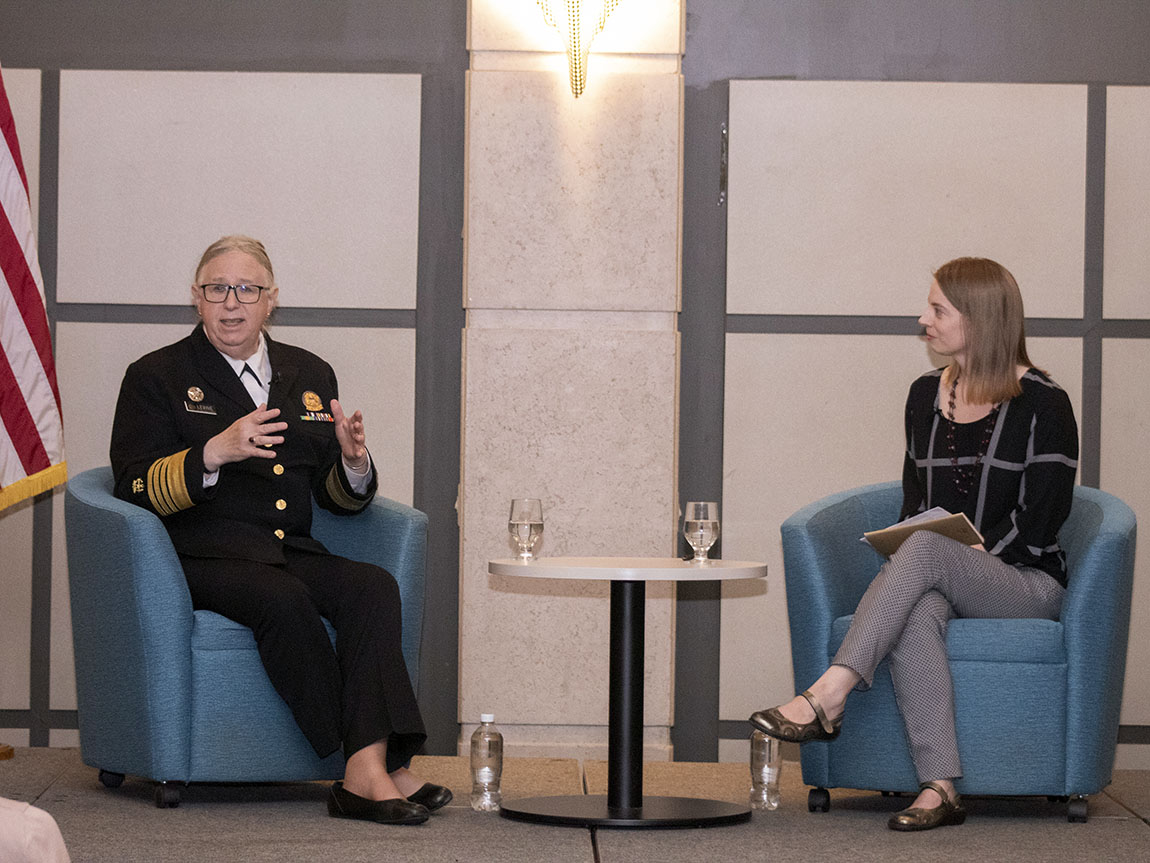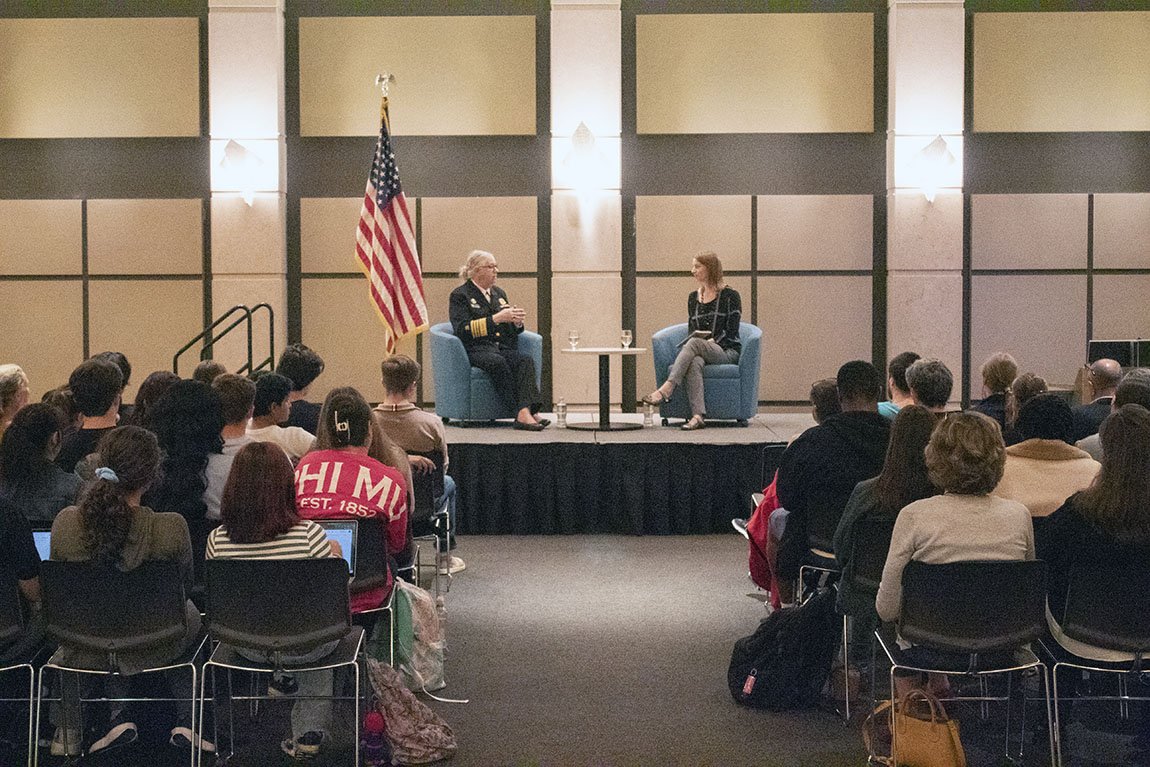U.S. Assistant Secretary for Health Admiral Rachel L. Levine, M.D. Visits Campus
Adm. Levine discussed public health and health equity for all and fielded questions from Muhlenberg students, faculty and staff.By: Meghan Kita Tuesday, October 15, 2024 02:05 PM
 U.S. Assistant Secretary for Health Admiral Rachel L. Levine, M.D. and Assistant Professor of Public Health Kathleen Bachynski. Photos by Sierra Addy ’27 and Eve Polek ’27
U.S. Assistant Secretary for Health Admiral Rachel L. Levine, M.D. and Assistant Professor of Public Health Kathleen Bachynski. Photos by Sierra Addy ’27 and Eve Polek ’27On Wednesday evening, Admiral Rachel L. Levine, M.D. visited campus to discuss public health and health equity for all in front of a Miller Forum packed with students, faculty and staff. Assistant Professor of Public Health Kathleen Bachynski kicked off the discussion, which would be followed by questions from the audience, by asking Adm. Levine to define “health equity.”
“Health equity is the highest attainment of health for all people, and I emphasize the ‘all people,’” said Adm. Levine, who serves as the 17th Assistant Secretary for Health for the U.S. Department of Health and Human Services and the head of the Commissioned Corps of the U.S. Public Health Service. “I really feel we have not made true progress unless we have all made progress.”
“Health equity is the highest attainment of health for all people, and I emphasize the ‘all people.’ I really feel we have not made true progress unless we have all made progress.”
—Admiral Rachel L. Levine, M.D.
The two discussed “social determinants of health,” social factors that influence health such as discrimination, housing, food and nutrition security, environmental health, education and more. For example, sickle cell disease, a devastating genetic condition that disproportionately affects Black and Hispanic/Latinx Americans, hasn’t historically gotten the research attention that other devastating genetic conditions have. Her office is working to rectify this health disparity.
Adm. Levine noted that a newer social determinant of health is the political context of the state you live in, specifically referring to states that have restricted access to abortion and/or care for transgender youth. “We have created in the U.S. medical refugees who must leave their state or move from their state to seek medical care,” she said.

She oversees a newly created Office of Climate Change and Health Equity (OCCHE) to work at the intersection of climate and health. “What keeps me up at night [is] the impacts of climate change on health,” she said, noting that extreme storms, extreme heat and vector-borne diseases like Lyme disease and dengue fever are all connected to climate change. “We talk about it as an existential threat. Some people think that means in the future, 10 or 20 years from now. All you have to do is be in Sarasota, Florida, tonight and you’ll see the impacts of climate change on health right now.”
“I am positive and optimistic. I am positive and optimistic because I choose to be positive and optimistic, because being positive and optimistic allows me to keep working.”
—Admiral Rachel L. Levine, M.D.
Still, the tone of the discussion and Q&A was largely positive. Adm. Levine recalled being a physician at the start of the AIDS epidemic in the United States, when every patient she saw with the condition died of it. Today, antiretroviral drugs allow HIV-positive individuals to live normal lives (and to lower their viral loads so they will not transmit HIV), and pre-exposure prophylaxis (PrEP) allows HIV-negative individuals to protect themselves from infection. The remaining challenge is getting those medications to the people who need them. “I was there at the beginning of the AIDS crisis. I’m going to be there at the end of the AIDS crisis,” Adm. Levine said.
In response to a student question about ensuring transgender youth across the U.S. have access to medical care, Adm. Levine addressed the many challenges inherent in this issue but concluded, “I am positive and optimistic. I am positive and optimistic because I choose to be positive and optimistic, because being positive and optimistic allows me to keep working.”
 Deputy Assistant Secretary for Health Policy Adrian Shanker ’09, Provost Laura Furge, Adm. Levine, President Kathleen Harring and Chief of Staff Sonya Conrad ’06
Deputy Assistant Secretary for Health Policy Adrian Shanker ’09, Provost Laura Furge, Adm. Levine, President Kathleen Harring and Chief of Staff Sonya Conrad ’06
Adm. Levine also reflected on her long career, which began when she was a pediatrician and adolescent medicine specialist in academic medicine focused on the intersection between mental and physical health. In 2015, she was named Pennsylvania’s Physician General. She recalled telling her mother, then in her 90s, about the appointment. Her mother replied, “Honey, that’s wonderful. You know, that could lead to something!”
The audience laughed as Adm. Levine went on: “I thought it was something, but you know. My mother was always right, and it did lead to something,” referring to her appointment as Pennsylvania Secretary of Health in 2017 and then as the U.S. Assistant Secretary for Health in 2021. “So, you never know where your life and your career are going to take you.”
